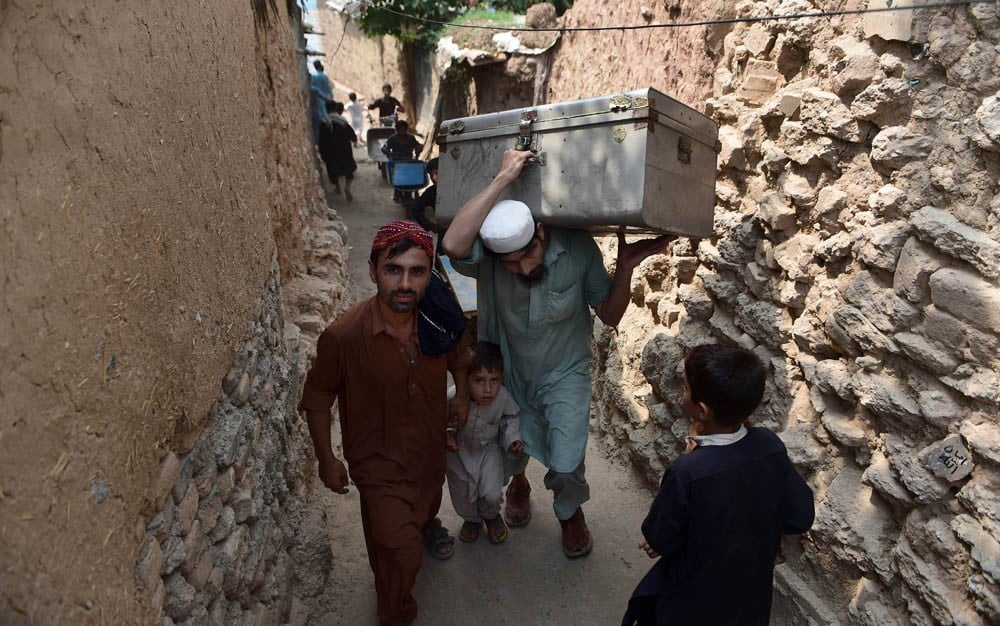
Only 10 settlements are recognised by the capital city

Katchi abadis have existed in Islamabad for three to four decades. Mostly populated by the city’s working classes, they are a direct consequence of unplanned growth, poverty, urban development needs, and displacement caused by conflict or natural disasters and, most importantly, due to the housing shortfall in the country, which is currently estimated at over 10 million units countrywide.
"In Islamabad, katchi abadis first emerged when labour was required for the construction of the city in the 1960s. There were two main labour settlements at first, one in G-8/3 and the other in Muslim Colony near Bari Imam. Once the initial development needs subsided, in the mid-70s, CDA started to evict these settlements, resulting in resistance, particularly in the G-8," says Ammar Rashid, an activist associated with the Awami Workers Party (AWP) and All Pakistan Alliance for Katchi Abadis (APAKI).
He informs that in the past many of the occupants were resettled to various areas around the city after negotiations, in view of the city’s occupational needs and ethnic profile of the residents. Most of the Christian labourers (consisting mostly of sanitation workers) were settled in G-7, G-8, F-7 and F-6 (to serve the upper-class population of these sectors), Kashmiri/Hazara labourers were located around Muslim colony, and Pakhtun labourers were settled in the outskirts, I-11/H-11 and I-10 sectors.
According to CDA figures, there are around 52 katchi abadis in Islamabad, out of which it recognises only 10. The population of these informal settlements exceeds 100,000. The biggest demographic category among katchi abadis is Punjabi Christians who comprise roughly 35 per cent of the population living in informal settlements. Other Punjabi/Potohari groups are around 26 per cent, Pakhtuns are around 20 per cent, and Kashmiri/Hazaras around 10 per cent of the population respectively. It should be noted, however, that these figures were compiled by the Akhtar Hameed Khan Resource Center about seven years ago.
The vast majority of katchi abadi residents are labourers, sanitary workers, domestic workers, or lower-staff government servants. The slum residents, Rashid says, "are in many ways integral to the Capital’s economy, providing a steady, local source of labour for jobs and services crucial to Islamabad’s development and upkeep." However, most of the residents of these slums are uncertain about the ownership of their homes and livelihoods, "given the threat of eviction by the state, against which they possess little social or legal protection," he says.
Also read: Pious claims
Saying that these abadis are inhabited by criminals and terrorists is simply adding insult to injury. "Sure, the squalid conditions of katchi abadis may push some of its residents towards crime, but a far greater number of ‘criminals’ live in pakki abadis like F-6, F-7, E-7, etc. If we were to follow the CDA’s logic about crime and punishment, we would have to raze all of these sectors to the ground," says Rashid.
The fact of the matter, in his opinion, is that accusations of terrorism are a means for the CDA to evade responsibility of their own mistakes and crimes by demonising the entire slum populations, particularly Pakhtuns. "Ultimately, terrorism is not caused by people living in slums, it is caused by the state’s own policies and decades-long support for terror groups."
Umar Gilani, a lawyer working with the Foundation for Development for Fundamental Rights, also challenges the allegations leveled by CDA against the residents of Afghan Basti. "These are mostly poor labourers/vendors but the authority calls them criminals and wants to throw them out of here." He tells TNS that Afghans used to once live there but they were evicted from here during Musharraf’s rule. "Since then it is inhabited primarily by local Pashtuns who have migrated here from war-ravaged zones."
Gilani is representing 66 residents/protestors, who were arrested by police during the clean-up operation in I-11, in the court. He says the police have admitted that only two or three of the arrested protestors seem to have Afghan background while the rest are local Pakhtuns. About the other katchi abadis that face demolition, he says many of these house Christian sanitary workers.
Gilani calls for an end to eviction process which does not offer alternative settlements for the victims. "The state is using brute force during the operation, a proof of which is that a disabled 70-year old man was also arrested by the police in I-11." Besides, he says, "a new-born child lost his life due to suffocation caused by tear gas used by the police."